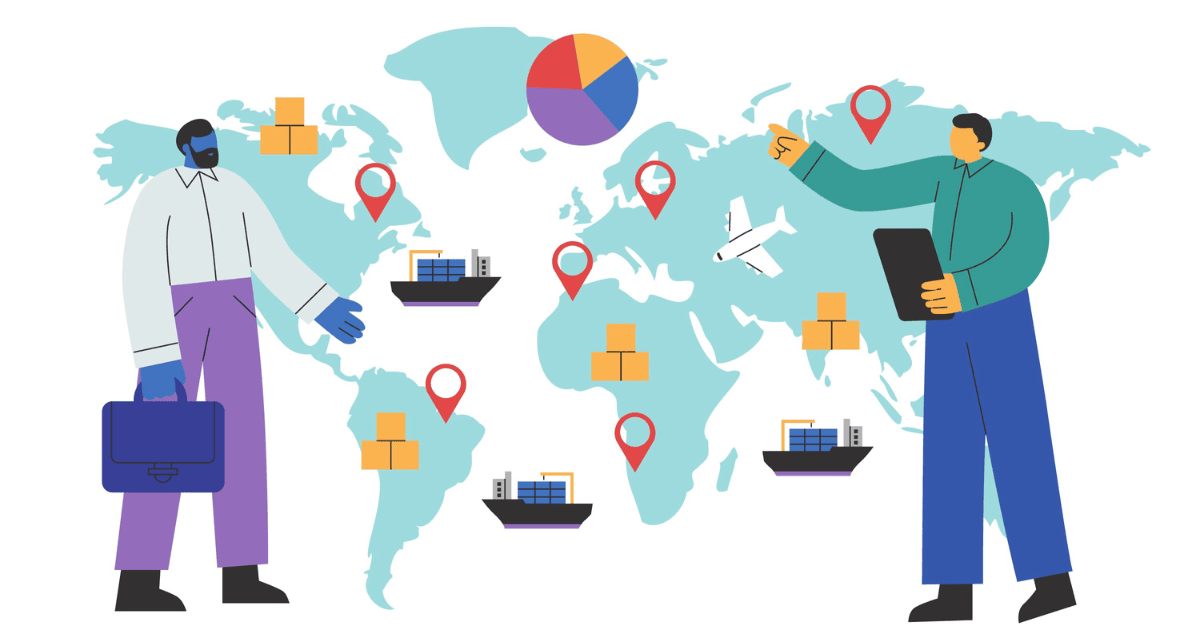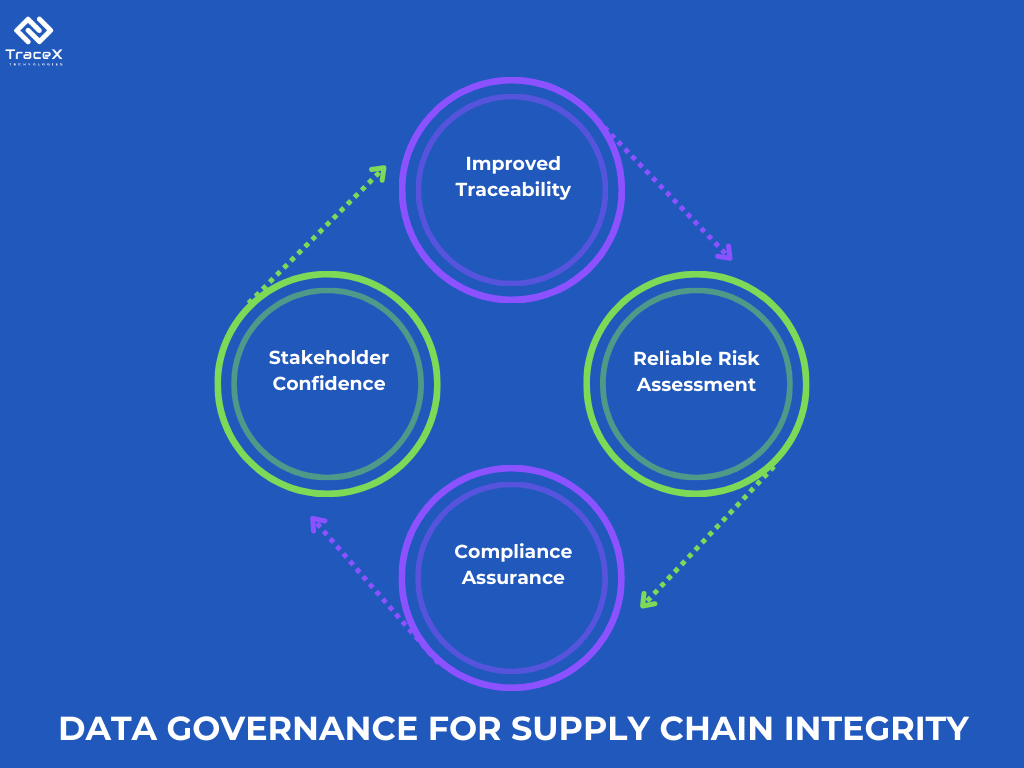Contact: +91 99725 24322 |
Menu
Menu
Quick summary: Discover essential strategies for achieving supply chain integrity under the EU Deforestation Regulation (EUDR). Learn how advanced technologies, stakeholder engagement, and rigorous auditing practices can help your business ensure compliance, enhance transparency, and maintain a deforestation-free supply chain. Prepare now for the EUDR’s full implementation and navigate regulatory complexities effectively.

The push for zero deforestation and sustainable practices is reshaping how we view and manage our supply chains, making integrity not just a regulatory requirement but a cornerstone of corporate credibility and consumer trust. Maintaining supply chain integrity under the EU Deforestation Regulation (EUDR) is more crucial than ever. As global attention sharpens on the environmental impact of commodities, businesses are under heightened scrutiny to ensure that their supply chains are not only compliant but also transparent and responsible.
With only over four months remaining before the full enforcement of the EUDR, companies must begin their preparations immediately. It is crucial to focus on updating policies, refining management systems, and ensuring the integrity of supply chains.
As part of the Green Deal, the EU aims to eliminate deforestation from global supply chains and encourage more sustainable land-use practices. This objective led to the introduction of the EU Deforestation Regulation (EUDR), which took effect on June 29, 2023. According to Article 3 of the EUDR, certain commodities and related products cannot be sold or exported within the EU unless they meet the following criteria:
Supply chain integrity refers to the assurance that every step of the supply chain—from raw materials to finished products—meets certain standards of transparency, accountability, and ethical practices. In simple terms, it’s about knowing that what you’re buying has been sourced and handled in a way that aligns with your values and regulatory requirements. Under the EU Deforestation Regulation (EUDR), maintaining this integrity is not just important; it’s crucial. EUDR demands that products entering the EU are free from deforestation and forest degradation. This means that every link in the supply chain must be accountable and transparent, ensuring that no part of the chain contributes to environmental harm.
Failing to uphold supply chain integrity can have serious repercussions. Legally, companies face hefty fines and legal challenges if they do not comply with EUDR’s stringent requirements. Financially, the cost of rectifying non-compliance and potential loss of business can be significant. Reputational damage is also a major risk; consumers and partners increasingly favor businesses with robust sustainability practices. Being associated with deforestation or unethical practices can tarnish a brand’s reputation and erode trust. In short, maintaining supply chain integrity is vital not just for regulatory compliance, but for protecting your business’s long-term success and credibility.
Transparency is the bedrock of supply chain integrity. It involves clear, open communication about the sourcing and handling of products at every stage of the supply chain. EUDR supply chain transparency means providing detailed information on where and how raw materials are sourced and ensuring that all practices are visible and verifiable. Transparency helps build trust with stakeholders and allows for better management of potential risks.
Traceability refers to the ability to track and verify the journey of a product from its origin to the end consumer. In the context of supply chain integrity and EUDR, this means having a supply chain mapping in place to monitor and document each step of the product’s lifecycle. Digital tools like blockchain and IoT can play a pivotal role here, offering real-time data and creating an immutable record of the product’s journey. Effective traceability ensures that products meet regulatory standards and helps quickly address any issues that arise.
Accountability ensures that every party involved in the supply chain is responsible for their actions and practices. It’s about having clear roles and responsibilities and holding each link in the chain to the same standards of ethical behaviour and compliance. Under EUDR, this means not only ensuring that your own practices are up to par but also that your suppliers and partners adhere to the same principles. Accountability fosters a culture of integrity and helps prevent lapses that could lead to non-compliance.
Verification involves third-party assessment and certification to confirm that supply chain practices meet regulatory and ethical standards. For EUDR, this means engaging with independent auditors who can assess your compliance with the regulation’s requirements. These external checks provide an added layer of credibility and assurance, helping to build trust with stakeholders and demonstrating a commitment to maintaining high standards.
Interoperability and integration are essential for maintaining supply chain integrity within the EUDR framework. By ensuring seamless data flow and connectivity between traceability systems and other relevant systems, businesses can enhance transparency, reduce errors, and demonstrate compliance with EUDR requirements. This integration fosters trust among stakeholders, supports efficient operations, and ultimately contributes to a more sustainable and responsible supply chain.
The EU Deforestation Regulation introduces several new requirements that directly impact how supply chains are managed. Companies must now prove that their products do not contribute to deforestation or forest degradation, which involves providing detailed documentation and evidence of compliant practices. This includes proving that commodities are sourced from areas where no deforestation has occurred, and that supply chain due diligence is performed to ensure continued compliance.
EUDR places particular emphasis on certain high-risk commodities, such as soy, palm oil, coffee, cocoa, and rubber. These products are often linked to deforestation and land use changes, making them a focal point for regulatory scrutiny. Businesses dealing with these commodities must be especially diligent in ensuring their supply chains are transparent, traceable, and compliant with EUDR requirements.
Achieving a deforestation-free supply chain under EUDR means more than just avoiding direct deforestation. It requires a comprehensive approach to sustainability, including responsible sourcing practices, monitoring land use changes, and engaging with suppliers to ensure they adhere to strict environmental standards. For companies, this means investing in systems and processes that support these goals and demonstrating a commitment to environmental stewardship in every aspect of their supply chain.

Effective data governance is essential for ensuring supply chain integrity under the EUDR. Data governance involves establishing policies, procedures, and standards for managing data throughout its lifecycle. In the context of the EUDR, data governance should address:
1. Data Collection: Defining the data points that need to be collected at each stage of the supply chain, such as geolocation information, production methods, and certification status.
2. Data Quality: Ensuring the accuracy, completeness, and consistency of supply chain data through validation checks and audits.
3. Data Security: Protecting sensitive supply chain data from unauthorized access or disclosure, while enabling secure sharing with relevant stakeholders.
4. Data Retention: Establishing guidelines for retaining supply chain data for the required period, as specified by the EUDR.
The EUDR places a considerable burden on companies’ resources due to the complexity of many supply chains, which complicates data collection and risk analysis—two critical requirements of the regulation.
Key questions for companies include:
1. What legislation in the country of production is relevant?
2. How can regulatory requirements be managed effectively across different products and jurisdictions?
3. How can compliance be ensured, and necessary evidence be provided?
Addressing these challenges also involves a broader issue: maintaining close collaboration and ongoing engagement with suppliers, particularly lower-tier suppliers such as smallholders and local communities. These suppliers may require new skills and additional resources to help EU-based companies meet their legal obligations.
TraceX EUDR Compliance Platform plays a crucial role in helping businesses navigate and comply with the EU Deforestation Regulation (EUDR).
TraceX leverages blockchain and other advanced technologies to provide real-time tracking of commodities throughout the supply chain. This includes detailed records of the origin and journey of products, which is essential for meeting EUDR’s requirement for deforestation-free goods. The ability to trace every step of a product’s path ensures transparency and helps businesses demonstrate compliance with EUDR standards. The immutability feature is crucial for verifying that products are sourced in accordance with EUDR’s deforestation-free requirements and for maintaining a reliable audit trail.
TraceX automates the collection and management of due diligence documentation, reducing the administrative burden on businesses. This includes generating and storing compliance reports, certificates, and due diligence statements required by EUDR. The platform can be configured to align with various local regulations and EUDR requirements. This includes integrating compliance checks for local laws related to land use rights, environmental protection, and human rights.
TraceX provides tools for assessing risks associated with supply chain activities. These tools analyze data to identify potential non-compliance issues or areas of concern. By flagging these risks early, businesses can take corrective actions to address them before they escalate, ensuring continued compliance with EUDR.
Discover how TraceX transformed a Nigerian trading firm’s supply chain.
As the EU Deforestation Regulation (EUDR) approaches full implementation, ensuring robust supply chain integrity is paramount for compliance and long-term success. By leveraging advanced technologies, engaging stakeholders, and implementing rigorous auditing practices, businesses can navigate the complexities of EUDR effectively. The commitment to transparency, traceability, and accountability not only helps meet regulatory requirements but also fosters trust and enhances sustainability efforts. Proactive preparation and continuous diligence in managing and monitoring supply chains will be essential in aligning with EUDR standards and achieving a deforestation-free supply chain.
